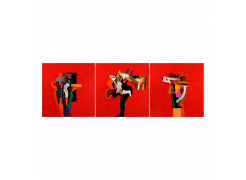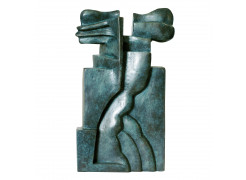Additional info:
A pillar of Modern Arab art, Dia Azzawi greatly influenced the development of art in the Arab world. His education in both Archaeology and Fine Arts (under the mentorship of the renowned Hafidh al-Droubi) factors in his work in equal measure. Coupled with his artistic sensitivity, Azzawi’s academic interest in archaeology and history inspired the incorporation of Iraqi folklore and ancient subject matter into his practice. His engagement with the rich tapestry of ancient history from the Fertile Crescent was combined with extant discourse around identity. Thus he merged the past with present in his work to expose existential questions he and his contemporaries faced. Azzawi made his mark on the Baghdadi scene in the 1960s-1970s, participating in various artistic groups and events. Beyond taking part in the pioneering Al-Wasiti Festival in Baghdad, he founded the New Vision Group (al-Ru'yya al-Jadidah) in 1969 debating themes such as identity and modernity. He concurrently held the role of Director of the Iraqi Antiquities Department. Amid the political upheavals of the late 1970s, he sought refuge in London, a move that permanently separated him from his homeland. His legacy as an artist is recognized globally, with works of his showcased in esteemed institutions including the Tate Modern and the British Museum. Notably, a retrospective exhibition of his work, "From 1963 until Tomorrow," was curated by Catherine David at Mathaf, the Arab Museum of Modern Art in Doha (2016).
-
Nazem Al-Jaafari
Damascus, 1918 - 2015 -
Mazen Rifai
b. Baalbek, Lebanon, 1957 -
Horia Damian
Bucharest, Romania, 1922 - Paris, France, 2012 -
Charles Le Bars
1925 - 2012 -
Francis Picabia
Paris, France, 1879 - Paris, France, 1953

